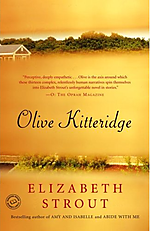Olive Kitteridge by Elizabeth Strout
I chose this book out of the library because of a quote on the back cover by Richard Bausch, a fiction writer who was one of my teachers several years ago now. He writes: “Elizabeth Strout restores my faith in the word, in the quality of fiction to shine light on even the dark and still make us feel refreshed and cleansed and glad.”
Make us feel refreshed and cleansed and glad.
Can reading do that?
Can reading do that sometimes?
It doesn’t hurt that Ms. Strout’s book takes place on the coast of Maine. Place is part of it. But not all of it. There’s also a skill, a nuance, an attention to the details and foibles of her characters—and a kindness. Just a deep kindness and generosity toward her characters.
And now I realize—it doesn’t surprise me that Richard Bausch likes Elizabeth Strout as a writer. I think he was the teacher who told us that you have to find a way to love your characters in order to write fiction. You have to love your characters.
That’s what I feel when I sit down to read Olive Kitteridge—that Ms. Strout loves this collection of characters she’s assembled in this small town on the Maine coast. Not love in a cloying or sentimental way. But in a real way. And she’s doing something very interesting in these stories with the connections and inter-connections between and among these characters. And, because of a way that she writes, leaving some things out—gaps—spaces—and doing this so skillfully—I find myself participating in her town as I read. I find myself participating in this sense of connection. All the time carried by her prose.
I wonder if this has something to do with what Plato called harmony.
(That quote by Plato in Blake Morrison’s article, The Reading Cure. Reading as “an aid to bringing our soul-circuit, when it has got out of tune, into order and harmony with itself.”)
______________________________________________________
See also:
An August 2008 interview by Robert Birnbaum in The Morning News which includes this quote by Ms. Strout: “I feel very strongly that people bring their own life experiences to every book, and so whatever book I write will be a different book for every person who reads it. It’s their book: I give it to them.”
(The kind of quote that makes me want to say thank you.)

